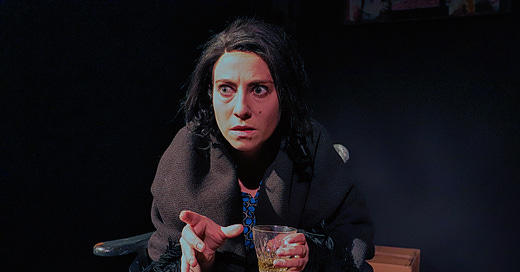Theatre review: Katty Barry - Queen of The Coal Quay
Pádraig O’Connor reviews an uneven and entertaining depiction of the life and times of Katty Barry that delivers laughs, nostalgia as well bits of the set which are for sale.
If ‘Katty Barry - Queen of The Coal Quay’ is anything to go by, then the eponymous protagonist was the very living embodiment of that wondrous Cork profession: she was a good old fashioned rebel.
Having passed away in 1982, her boisterous and often tumultuous life as the proprietor of an eating house on Dalton’s Avenue has since been turned into a play, and is currently showing at the Cork Arts Theatre following a sold out run when last seen in the city.
The action, such as it is, mainly takes place in her now legendary establishment, which served food typically viewed as a cheap alternative to what you’d find in a restaurant. On the menu was a variety of traditional local cuisine, bacon, cabbage, turnip, pudding and a dish Marco Pierre White once said would be his last meal on earth, a pig’s trotter and pomme purée...alternatively marketed in Katty Barry’s as, crubeen and spuds.
So far, so quaint, but where Katty or “Kay”, as she is referred to throughout the play, got into some difficulty, is that she also happened to sell alcohol on the premises late at night, but without a licence. This leads to some inevitable run-ins with the law, giving rise to visits from the Gardaí and a couple of appearances in front of a judge.
Written and directed by Marion Wyatt and featuring Cork native Maire O’Donovan in the lead role, it is debatable as to whether we really get an accurate, all encompassing picture of who Katty Barry was as a person, or whether her story, railing against the big bad corporation and the law, is used more in a symbolic way to tell the ongoing tale of gentrification in the city. O’Donovan, who is on stage for almost the entirety of the show, is full of energy and gumption, but her performance primarily oscillates between two poles: charming, conniving business woman and scowling rebel, without very much nuance in between.
Alongside her, Pearse O'Donoghue and Liam O’Caoimh play a variety of characters who lack any real depth, but instead serve to shine a favourable light on Katty and her good nature. O’ Donoghue’s drunken Kerryman had the audience in stitches, whereas O’ Caoimh’s docile policeman didn’t really garner the reaction his behaviour ought to have.
As a result, there are certainly some notable questions about Katty overlooked. Did she make a lot of money from her enterprise? If so, what did she do with her money? Was she really taking on the law in order to help out some friends in distress at her own very high risk, as it claims in the play?

Looking around the Coal Quay (Cornmarket Street) today, we all know how this battle of altruism and community turned out, as the area, once a thriving market place, has now been transformed into just another sterile street, which in a token nod to the past, occasionally plays host to some stalls selling food and other bric-a-brac. Such is the nature of life. Things change. Perhaps in forty years time someone will write a play about buying ready-to-eat avocados from Mexico in Lidl, and discount designer label clothing made by children in Bangladesh from TK Maxx and people will feel nostalgia for the time we currently live in.
Nostalgia certainly plays a large role in this production. The sound effects interspersed here and there, could easily have been sampled from the TV show ‘Reeling in the Years’, which is apt, as there are plenty of trips down memory lane for audience members who were around in Katty’s time. The mention of a certain childhood drink had the crowd overjoyed, but there is plenty more in this play to keep people interested, mostly however, from a sociological and historical viewpoint.
In this regard, some of the issues raised, understandably affected some of the audience members, as they are still very much with us today. Domestic abuse, prostitution, police corruption and alcohol dependence are all touched upon and continue to form a huge part of daily life in the city. Indeed, there are other themes mentioned which might as well be ripped from the present day and they are housing, and the issue of flooding in the city.
Jarringly however, the set features a lot of artwork hanging in the background, which didn’t exactly give the impression of the inside of an eating house, but according to the programme they are for sale! Perhaps the writer/director learned a lot more about Katty Barry than we imagine and would like to emulate her entrepreneurial skills.
All in all, as a historical document and a way of viewing the ever changing face of Cork City, ‘Katty Barry -Queen of The Coal Quay’ is very interesting indeed, but as a piece of drama, unfortunately, less so. The story chugs along at a great pace though, and if you’re from Cork or interested in the city, then it’s certainly worth a look.
‘Katty Barry – Queen of the Coal Quay’ is on nightly at 8pm at the CAT Club on Carroll’s Quay until Saturday, August 5. There is also a lunchtime show this Friday, August 4 from 12pm. Tickets and more information here.
Pádraig O’Connor is a playwright from Kerry, living in Cork city. You can read more of his reviews for T+D here.
Cornering the Market on Cornmarket
In the Cork of 2021, trading outside has been seen as a solution to the hospitality sector being able to survive the Covid-19 crisis. To see our city streets full of people dining al fresco, the reduction of traffic on the street and the increased pedestrianisation of the city have all …





